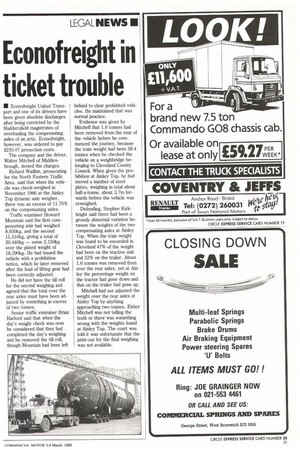Econofreight in ticket trouble
Page 25

If you've noticed an error in this article please click here to report it so we can fix it.
• Econofreight United Transport and one of its drivers have been given absolute discharges after being convicted by the Huddersfield magistrates of overloading the compensating axles of an artic. Econofreight, however, was ordered to pay £210.07 prosection costs.
The company and the driver, Walter Mitchell of Middlesbrough, denied the charges.
Richard Wadkin, prosecuting for the North Eastern Traffic Area, said that when the vehicle was check-weighed in November 1986 at the Ainley Top dynamic axle weigher, there was an excess of 11.75% on the compensating axles.
Traffic examiner Howard Mountain said the first compensating axle had weighed 8,930kg, and the second 11,510kg, giving a total of 20,440kg — some 2,150kg over the plated weight of 18,290kg. He had issued the vehicle with a prohibition notice, which he later removed after the load of lifting gear had been correctly adjusted.
He did not have the till roll for the second weighing and agreed that the total over the rear axles must have been adjusted by something in excess of two tonnes.
Senior traffic examiner Brian Harford said that when the day's weight check was over he considered that they had completed the day's weighing and he removed the till roll, though Mountain had been left behind to clear prohibited vehicles. He maintained that was normal practice.
Evidence was given by Mitchell that 1.6 tonnes had been removed from the rear of the vehicle before he commenced the journey, because the train weight had been 39.4 tonnes when he checked the vehicle on a weighbridge belonging to Cleveland County Council. When given the prohibition at Ainley Top, he had moved a number of steel plates, weighing in total about half-a-tonne, about 3.7m forwards before the vehicle was reweighed.
Defending, Stephen Kirkbright said there had been a grossly abnormal variation between the weights of the two compensating axles at Ainley Top. When the train weight was found to be exceeded in Cleveland 47% of the weight had been on the tractive unit and 52% on the trailer. About 1.6 tonnes was removed from over the rear axles, yet at Ainley the percentage weight on the tractor had gone down and that on the trailer had gone up.
Mitchell had not adjusted the weight over the rear axles at Ainley Top by anything approaching two tonnes. Either Mitchell was not telling the truth or there was something wrong with the weights found at Ainley Top. The court was told it was unfortunate that the print-out for the final weighing was not available.




























































































